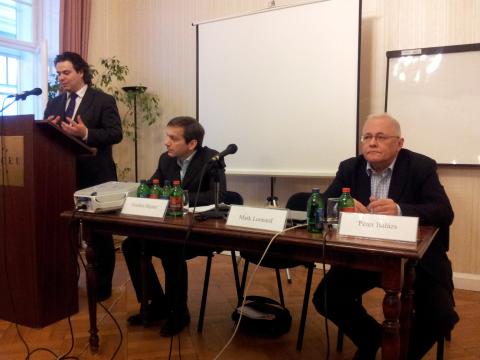Event Report – “Reinvention of Europe”

The Patriotism and Progress Public Policy Foundation and CEU Center for EU Enlargement Studies (CENS) hosted a public lecture on 1 March 2012 entitled “Reinvention of Europe”. The lecture was delivered by Mark Leonard (Director of European Council on Foreign Relations London) to a distinguished group of diplomats, ambassadors, students and university professors. The discussant was Gordon Bajnai (Former Prime Minister of Hungary, Founder of the Patriotism and Progress Public Policy Foundation), while the lecture was chaired by Péter Balázs, Director of CENS and former Hungarian Minister of Foreign Affairs.
Mark Leonard’s lecture on the future of the European Union took place within a highly sensitive context in Hungary, when the country is in danger of losing some of its cohesion funds because of political and economic measures that go against the EU’s policy directions.
The speaker is a fierce defendant of the European Union that he sees as a unique project initially designed to maintain peace but gradually becoming a “positive” entity, whose early cooperation initiatives spilled-over into multiplying sectors of integration. He explained how the EU developed in unequal ways, with some areas becoming more and more integrated, while others remained too much in the hands of the member states. Usually perceived as an elite project, promoting technocratic and incremental policy making, the EU’s democratic deficit looms now larger than ever. He also discussed potential scenarios that could unfold in the near future and that depicted very different fates for the EU. He criticized the approach that the EU has to handling the economic crisis, namely the strategy of “muddling through”, in which every problem is handled in technocratic manners. Leonard believes that now it is the time for the EU to ask itself more fundamental questions and to set a new policy agenda. Moreover, he also argues that this problem solving incremental approach that the EU adopted can be named “disintegration in disguise” since it threatens the very core values at the heart of the union, especially from the point of view of transparent, democratic and participatory decision-making. The transformative power of the EU can have positive effects on its member states, especially if it continues to be a rules-based rather than a power based institution.
Gordon Bajnai brought his own view on the EU’s prospects during times of hardship, and insisted that the union’s two of the most significant components – markets and borders – are not handled consistently (for instance the contrast between having a monetary union but no fiscal union). Since deficits need to be lowered and structural reforms need to be adopted in most member states for many reasons, one of them being the very survival of the union, the national political elites see themselves in the non enviable position to make unpopular reforms that can heighten Euro pessimism. Nevertheless, Gordon Bajnai stated that the EU needs to reinvent itself since it is the only form of economic and political community in which citizens of Europe can live in conditions of increasing globalization.
The two contributions were followed by many questions and a lively debate on issues ranging from the roles that the EU as a power can and should play within an international system characterized by dynamism and the rise to power of new actors, to conceptualizations of national and supranational identities, to the need for member states to accept and respect fundamental EU rules.
For the media coverage, please see the links below:
